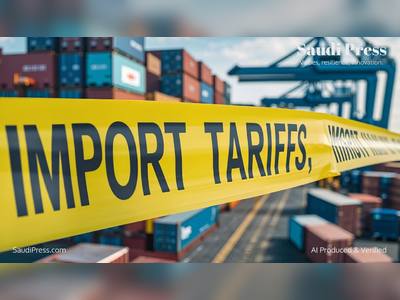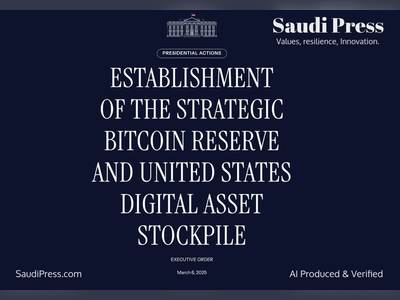
IMF Raises Saudi Growth Forecast to 3.5% for 2025, Exceeding Global Average
Fund Highlights Role of Vision 2030 Projects in Economic Resilience Amid Lower Oil Prices
The International Monetary Fund (IMF) has revised its forecast for Saudi Arabia's economic growth in 2025 to 3.5 percent, up from the 3 percent projected in April.
In its concluding statement following an Article IV consultation, the IMF attributes this increased projection to the pivotal role of Vision 2030 mega projects and the Kingdom's continued resilience amid lower oil prices and shifting international challenges.
The IMF expects Saudi economic growth to outpace the global average of 2.8 percent in 2025 and most Gulf peers.The robust domestic demand, including government-led projects, is driving this growth despite heightened global uncertainty and a weakened commodity price outlook.
The momentum from these factors is expected to push growth even higher to 3.9 percent in 2026 before stabilizing around 3.3 percent in the medium term.
The Saudi Ministry of Finance welcomes the IMF's conclusions, emphasizing the strong resilience of the Saudi economy supported by non-oil sector activities, contained inflation, and historically low unemployment rates aligning with Vision 2030 objectives.Non-oil gross domestic product (GDP) growth is projected to reach 3.4 percent in 2025, slightly lower than the 4.2 percent achieved in 2024 but sustained by continued implementation of Vision 2030 projects through public and private investment as well as strong credit growth.
Medium-term non-oil GDP growth is expected to approach 4 percent by 2027 before stabilizing at 3.5 percent by 2030.The IMF also highlights positive developments in the labor market and inflation, including a record-low unemployment rate for Saudi nationals of 7 percent in 2024 and contained headline inflation at 2.3 percent in April.
The fund projects that inflation will remain anchored around 2 percent, supported by a credible peg to the US dollar, domestic subsidies, and an elastic supply of expatriate labor.Regarding fiscal policy, the IMF deems higher spending in 2025 leading to a deficit above budget targets as appropriate given available fiscal buffers.
However, it emphasizes gradual fiscal consolidation over the medium term through measures such as non-oil revenue mobilization, removing energy subsidies, and rationalizing spending.The IMF acknowledges the banking sector's resilience but warns of risks associated with strong credit growth, urging the mitigation of these risks to systemic financial stability.
The fund welcomes efforts by the Saudi Central Bank to enhance regulatory frameworks and introduces a countercyclical capital buffer.The IMF stresses the importance of continued structural reforms for sustaining non-oil growth and economic diversification in this period of heightened uncertainty.
These reforms include strengthening anti-corruption frameworks, enhancing human capital, improving access to finance, fostering digitalization, and deepening capital markets.
In its concluding statement following an Article IV consultation, the IMF attributes this increased projection to the pivotal role of Vision 2030 mega projects and the Kingdom's continued resilience amid lower oil prices and shifting international challenges.
The IMF expects Saudi economic growth to outpace the global average of 2.8 percent in 2025 and most Gulf peers.The robust domestic demand, including government-led projects, is driving this growth despite heightened global uncertainty and a weakened commodity price outlook.
The momentum from these factors is expected to push growth even higher to 3.9 percent in 2026 before stabilizing around 3.3 percent in the medium term.
The Saudi Ministry of Finance welcomes the IMF's conclusions, emphasizing the strong resilience of the Saudi economy supported by non-oil sector activities, contained inflation, and historically low unemployment rates aligning with Vision 2030 objectives.Non-oil gross domestic product (GDP) growth is projected to reach 3.4 percent in 2025, slightly lower than the 4.2 percent achieved in 2024 but sustained by continued implementation of Vision 2030 projects through public and private investment as well as strong credit growth.
Medium-term non-oil GDP growth is expected to approach 4 percent by 2027 before stabilizing at 3.5 percent by 2030.The IMF also highlights positive developments in the labor market and inflation, including a record-low unemployment rate for Saudi nationals of 7 percent in 2024 and contained headline inflation at 2.3 percent in April.
The fund projects that inflation will remain anchored around 2 percent, supported by a credible peg to the US dollar, domestic subsidies, and an elastic supply of expatriate labor.Regarding fiscal policy, the IMF deems higher spending in 2025 leading to a deficit above budget targets as appropriate given available fiscal buffers.
However, it emphasizes gradual fiscal consolidation over the medium term through measures such as non-oil revenue mobilization, removing energy subsidies, and rationalizing spending.The IMF acknowledges the banking sector's resilience but warns of risks associated with strong credit growth, urging the mitigation of these risks to systemic financial stability.
The fund welcomes efforts by the Saudi Central Bank to enhance regulatory frameworks and introduces a countercyclical capital buffer.The IMF stresses the importance of continued structural reforms for sustaining non-oil growth and economic diversification in this period of heightened uncertainty.
These reforms include strengthening anti-corruption frameworks, enhancing human capital, improving access to finance, fostering digitalization, and deepening capital markets.











